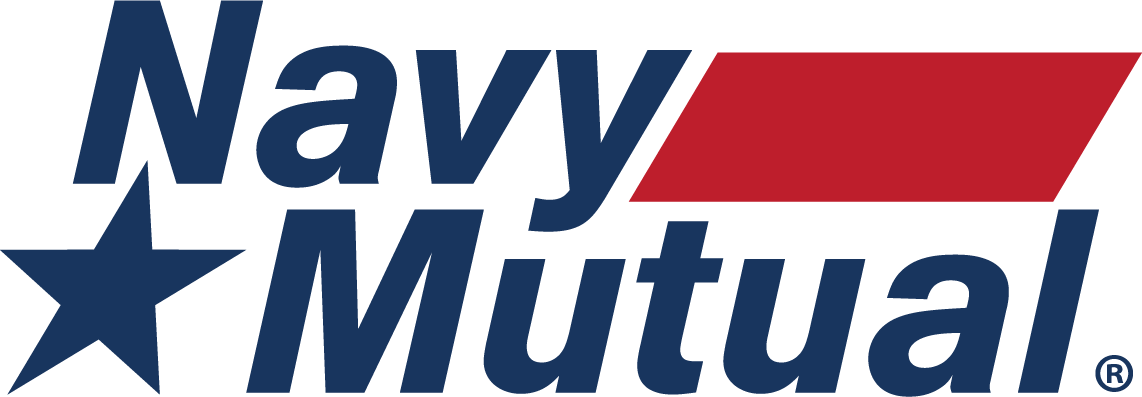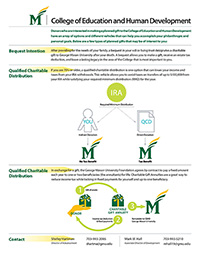
Gifts of cash
- Give online: you can make a one time or recurring gift simply and securely.
- Write a check.
You can mail a check, made payable to George Mason University Foundation Inc., to:
College of Education and Human Development
4400 University Drive, MS 2F1
Fairfax, VA 22030
- Make a wire transfer: we welcome gifts by wire transfer. To inquire, please email the Development Team at cehddev@gmu.edu.
If you have a loved one who has a close connection to Mason, establishing a memorial or tribute gift is a meaningful way to honor your loved one or celebrate a special occasion such as a reunion while supporting future Patriots. Your gift will be a lasting tribute to your loved one and make a difference in the lives of George Mason students. Learn more.
Gifts of stocks, bonds and assets
When you donate appreciated securities or bonds you have held more than one year, you can reduce or even eliminate federal capital gains taxes on the transfer. You may also be entitled to a federal income tax charitable deduction based on the fair market value of the securities at the time of the transfer.
Want to make a big gift to George Mason without touching your bank account? Consider real estate. Such a generous gift helps us continue opening doors of opportunity for our students for years to come. And a gift of real estate also helps you. When you give appreciated property you have held longer than one year, you qualify for a federal income tax charitable deduction. This eliminates capital gains tax. Plus, you no longer have to deal with that property's maintenance costs, property taxes or insurance. You don't have to hassle with selling the real estate. You can deed the property directly to the George Mason University Foundation or ask your attorney to add a few sentences in your will or trust agreement. Learn more.
CEHD offers numerous other ways to give that can be smart strategies for donors and also make a lasting impact on for our faculty, staff, and students of our college and continue to grow CEHD’s profile. If you would like to discuss which options work best for you, please call Director of Advancement Shirley Hartman at (518) 810-8021.
Individual Retirement Accounts (IRAs)
If you are 70 ½ years old and older you can give any amount (up to a maximum of $100,000) per year from your IRA directly to a qualified charity such as the George Mason University Foundation without having to pay income taxes on the money. Gifts of any value $100,000 or less are eligible for this benefit and you can feel good knowing that you are making a difference at the Foundation. This popular gift option is commonly called the IRA charitable rollover, but you may also see it referred to as a qualified charitable distribution, or QCD for short. Learn more.
Endowed gifts
An endowment gift provides a brighter future for George Mason students. When you make a donation to our endowment, you give a gift with both immediate and long-term benefits. Endowment donations are invested. A portion of the annual income from the investment is used to address immediate needs at Mason. The remaining funds are reinvested to ensure that your support never ends. Learn more.
Planned gifts
A planned gift can be a unique way to create a lasting legacy for programs at our College that matter most to you. We’re pleased to offer different options that may work best for your charitable and financial goals and that may yield federal tax advantages. Some planned gifts can even give you an income throughout your lifetime.
To ensure a bold, progressive education for future generations of students, please consider including a gift to George Mason in your estate plan. We can help you find a gift that matches your family's need and charitable goals. If you would like to discuss which options work best for you, please call Director of Advancement Shirley Hartman at (518) 810-8021.
Popular Planned Gifts
George Mason University has been important in your life, and you want to recognize that relationship by leaving a gift in your will. Yet you also want the flexibility to change your will in the event that life circumstances change. You can do both. In as little as one sentence, you can complete your gift. This type of donation in your will or living trust helps ensure that we can continue educating tomorrow's leaders and innovators for years to come. Learn more.
Some prefer the increased flexibility that a beneficiary designation provides by using: IRAs and retirement plans, life insurance policies and commercial annuities. Learn more.
Gifts That Pay You Income
There's a way for you to support George Mason University and feel confident that you have dependable income in your retirement years. You can do this with a charitable gift annuity. This type of donation can provide you with regular payments and allow George Mason to help our students succeed, enrich the life of our community and contribute to solving some of the most complex global problems of our time. You can also qualify for a variety of tax benefits, including a federal income tax charitable deduction when you itemize. Learn more.
If you have built a sizable estate and also are looking for ways to receive reliable payments, consider a charitable remainder trust. These types of gifts may offer you tax benefits and the option for income. There are two ways to receive payments and each has its own benefits: The annuity trust pays you, each year, the same dollar amount you choose at the start. Your payments stay the same, regardless of fluctuations in trust investments. The unitrust pays you, each year, a variable amount based on a fixed percentage of the fair market value of the trust assets. The amount of your payments is redetermined annually. If the value of the trust increases, so do your payments. If the value decreases, however, so will your payments. Learn more.
Other Smart Ways to Give
A donor advised fund, which is like a charitable savings account, gives you the flexibility to recommend how much and how often money is granted to the George Mason University Foundation and other qualified charities. You can recommend a grant or recurring grants now to make an immediate impact or use your fund as a tool for future charitable gifts. Learn more.
Other Planned Gifts
There are two ways that charitable lead trusts make payments: A charitable lead annuity trust pays a fixed amount each year and is more attractive when interest rates are low. A charitable lead unitrust pays a variable amount each year based on the value of the assets in the trust. With a unitrust, if the trust's assets go up in value, for example, the payments go up as well. Learn more.
Corporate and Foundation Partnerships
CEHD is privileged to work with numerous corporations in the community to help provide opportunities for our students and faculty. In summer 2021, Amazon partnered with CEHD and the Maryland Chamber Foundation to offer 20 teaching externships for computer science education middle school and high school teachers in D.C., Maryland and Virginia. Learn more.
You or your spouse may already work for one of several thousand companies that support philanthropy of their employees through corporate gift match programs. By completing an application through your company, you may be able to double your gift and provide twice the benefit to the College.
Navy Mutual

The gift from Navy Mutual will support the Operation Educate the Educators program in redesigning and updating training modules. These trainings prepare educators to understand military-connected children’s unique needs and provide them appropriate support. The modules help educators identify and respond, which reduces these risks for military-connected children. Learn more.
The Hewlett Foundation Gift
Hewlett Foundation gift will help bridge research practice gap in education. EdPolicyForward and the Center for Advancing Human Machine Partnership will collaborate on a project that aims to better connect research to practice in education policymaking. Learn more.
George Mason University in search of corporate partners for Computer Science Teacher Externship Program
With support from Google, George Mason University will provide a paid externship experience for teachers who currently teach, or are interested in teaching, computer science so they can experience first-hand what computing careers might look like for their students. Through summer externships, and a companion graduate level project-based learning course, participating teachers can improve their computing skills and enhance how they teach computer science to students in order to spark students’ interests in computing-intensive careers.
We are in search of business partners who will provide a 2-4 week summer experience for teachers. The content and focus of the summer experience can be determined by the business, in partnership with George Mason faculty. Externships can be virtual or in person.
If you have questions about this or other giving options that may be best for you and your family, please call Director of Advancement Shirley Hartman at (518) 810-8021.
- Transfer Appreciated Assets Between Spouses Prior to Creating a Charitable Gift Annuity
Federal tax laws allow assets to be transferred between spouses without triggering capital gain or transfer taxes. In some cases, it may be beneficial for assets to be transferred between spouses prior to establishing a split interest gift arrangement. For example, the capital gain due on a gift annuity is spread over the life expectancy of the donor. If one spouse in a married couple uses his separate appreciated assets to establish a 2-life gift annuity for both of them, his reportable capital gain will be spread ratably over his life expectancy. If both spouses jointly own the appreciated property, however, the reportable capital gains will be spread ratably over both lives. The result is that capital gain is spread out over more years.
- Related Use Rule for Gifts of Tangible Property
In addition to cash, securities, and real estate, some individuals prefer to make charitable gifts of tangible personal property. Such property consists of physical items such as jewelry, artwork, collections, and antiques. The income tax charitable deduction for a gift of tangible personal property is typically limited to the cost basis, the amount the donor paid for the property. But if the charity puts the property to a use that is related to the organization’s charitable purposes, the deduction may be for the full fair market value generally documented in a qualified independent appraisal.
- Tax-Free Portion of Gift Annuity Payments with Low IRS Discount Rates
In the current atmosphere of historically low IRS discount rates, we hear a lot about the negative effect on the charitable deductions for gift annuities. While this is true and not likely to change in the near future, there is a flip side to the bad news; the tax-free portions of gift annuity payments are higher when the discount rate is low. This can be especially attractive to non-itemizers and donors with low AGI who have more deductions than they can use.
- Additions May Be Made to Charitable Remainder Unitrusts
In contrast to charitable gift annuities and charitable remainder annuity trusts, it is possible for donors to make additional contributions to charitable remainder unitrusts. This might be especially helpful to donors who wish to build up significant values in their trusts incrementally over the long run. Donors with a low AGI may want to space out their gifts so they can take the full income tax charitable deduction in the year of the gift.
- Bargain Sales and Capital Gains
One of the appealing aspects of bargain sale arrangements is that donors can escape the consequences of a portion of the long-term capital gains in addition to receiving a charitable income tax deduction. A bargain sale is the sale of property to the charity for less than fair market value. The net effect is that the bargain sale includes the gift of a portion of the property. Bargain sale properties typically have significant long-term appreciation; the proportion of the capital gains attributed to the charitable gift portion of the property is permanently forgiven, and the donor pays taxes only on the portion of the property that is sold. The charitable income tax deduction for the gift portion of the bargain sale offsets (at least partially) the tax on the reportable capital gains.
- Retained Life Estates With Low IRS Discount Rates
The retained life estate is a split interest gift of the donor’s home or farm, and as such, there is a charitable portion and a non-charitable portion. The value of the charity’s eventual right to sell or use the property is the charitable portion, while the value of the donor’s life tenancy is the non-charitable portion. When one goes up, the other goes down. The value of each year’s life tenancy is computed in part by using the IRS discount rate. If the discount rate is low, the value of the life tenancy is low, therefore, the value of the charitable portion is high.
- CRAT Special Rule from 2016
Charitable remainder annuity trusts must pass a minimum 10% charitable interest test, like charitable gift annuities, pooled income funds, and charitable remainder unitrusts. But the CRAT must pass an additional probability of exhaustion test (probability of corpus exhaustion may not be greater than 5.0%). Depending on the ages of the beneficiaries, it can be difficult for CRATs to pass the probability of exhaustion test when the IRS discount rate is relatively low. A ruling was issued in 2016 allowing the insertion of a special clause in the governing documents of new CRATs; the provision calls for the trust to terminate in favor of the charity if the trust corpus falls below 10% of its initial value plus 0.8% interest.
- Deductions Are High for PIF Contributions Right Now
The charitable income tax deduction for a contribution to a pooled income fund is based partly on the highest “PIF Rate of Return” of the past 3 calendar year (the so-called PIF Rate of Return is really just a slightly-adjusted measure of income yield). When the “PIF rates of return” are relatively low, that means the calculation assumes very little income will go to the income beneficiaries, suggesting that relatively more will be left for the remainder charities in the end. While the deductions for PIF contributions are not tied directly to the IRS discount rate, the “PIF Rate of Return” tends to move in parallel with the prevailing IRS discount rates.
- Relinquishing Split Interest Gifts
Life income gift arrangements (CGAs, CRTs, and PIFs) are mostly written for the remaining lives of named beneficiaries. If a beneficiary of one of these gift vehicles no longer needs or wants the income, he or she may permanently relinquish the life income benefit in favor of the charitable remainder organization. The same action may be taken with a retained life estate. This essentially accelerates the remainder gifts to charities, but the beneficiary or life tenant is giving up something of value; he or she may be entitled to an additional income tax charitable deduction for the additional gift to charity. Qualified appraisals are required if the value of the interest being relinquished is more than $5,000.
- QCDs Also Still Attractive
No current discussion of planned gifts would be complete without mentioning the ubiquitous Qualified Charitable Distributions (QCDs) from traditional IRAs. The so-called “IRA Rollover” allows persons who are 70 ½ years or older to transfer up to $100,000 each calendar year directly from traditional IRAs to qualified charitable organizations. There are no charitable income tax deductions for these gifts. Nonetheless a donor may choose to make a QCD because they will escape taxation that would otherwise be due on distributions of qualified retirement funds. This is especially attractive for non-itemizers and others who cannot derive any benefit from additional income tax charitable tax deductions.



